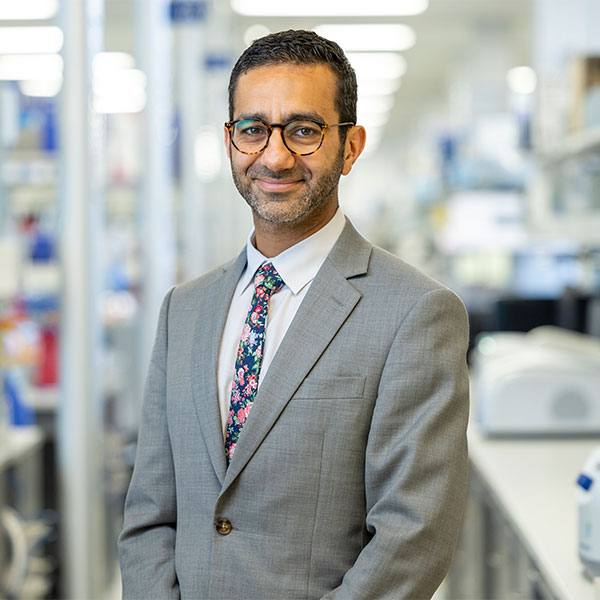-
Neurosciences
Neuroscience research mentors pay it forward

As a medical student in Mexico, Paola Suarez-Meade, M.D., was confident she wanted a career that included research along with clinical work. But among her teachers, the most common career paths involved making a choice: either treat patients or study disease.
A fascination with stem cells prompted her to seek out a research stint in the U.S. with neurosurgeon Alfredo Quinones-Hinojosa, M.D., who runs the Brain Tumor Stem Cell Laboratory. Observing his work — treating patients with brain cancer while running a lab to uncover the secrets of devastating tumors like glioblastomas — she realized she could craft a career combining both of her passions.
"I want to help people through my research — you can help millions if you find something interesting — as well as each of my patients, one by one," says Dr. Suarez-Meade. "I can help more people if I do both."
Her path illustrates the important role mentors play in shaping the next generation of clinicians and scientists. Following her research opportunity with Dr. Quinones-Hinojosa, who is chair of the Department of Neurologic Surgery at Mayo Clinic in Florida, Dr. Suarez-Meade returned to Mexico City for her clinical internship and served as chief intern at Médica Sur Hospital, a Mayo Clinic Care Network member. Now, she's back in Dr. Quinones-Hinojosa's lab, building her research skills as a postdoctoral fellow and studying brain cancer. Importantly, she's also helping up-and-coming trainees navigate the next steps of their careers, both stateside and through Mayo's ongoing connection to Medica Sur.
"A successful career, for me, will mean being able to give back to the world of neuroscience and medicine, making discoveries that can be applied to my future patients and helping other scientists and medical students grow," she says.
A powerful influence as mentor
At Mayo, Dr. Suarez-Meade is mentored in clinical research by Dr. Quinones-Hinojosa and Kaisorn Chaichana, M.D., as she gathers data in the operating room for brain-mapping studies to improve surgeries. She's also investigating how glioblastoma cells proliferate and migrate to invade healthy tissue, taking guidance from Hugo Guerrero-Cazares, M.D., Ph.D., and Paula Valentina Schiapparelli, Ph.D. "Being able to go to the operating room, see the surgeons interact with the patients, participate in clinical research — all really gives special meaning to why we're doing the basic science," she says.
In one project, she's testing a new microfluidic technology developed in collaboration with Johns Hopkins and patented by Dr. Quinones-Hinojosa's lab. The tool can distinguish cells that move readily through narrow channels, like those that exist in the brain, and already has enabled the lab to identify several genes associated with aggressive brain cancer. Dr. Suarez-Meade is determining whether this technology can be used alongside brain surgery to understand each patient's disease and help doctors choose the most effective chemotherapies.
Dr. Suarez-Meade also has become a mentor for other scientists-in-training, including Emily Norton, a Ph.D. candidate in the neuroscience program at Mayo Clinic Graduate School of Biomedical Sciences. The two worked together on a published study and have another underway. Norton, who studies the interaction of brain tumors with stem cells of the brain, is emphatic about Dr. Suarez-Meade's powerful influence. "Her never-ending enthusiasm and knowledge about tying basic science to clinical problems has helped me shape my career goals to work in translational neuro-oncology research," Norton says.
Building bridges to the rest of the world
That ability to inspire others stretches all the way to Mexico, including back at Médica Sur Hospital. "I'm very proud of my training at Médica Sur," Dr. Suarez-Meade acknowledges. "It's the No. 1 ranked private hospital in Mexico, and the education the hospital and physicians provide to trainees is outstanding."
As a Mayo Clinic Care Network member, Médica Sur collaborates with Mayo to address complex cases, bring new treatment options to the area and provide continuing education for physicians. Dr. Suarez-Meade has been front and center in these educational efforts, helping with Médica Sur's annual neurology and neurosurgery conference that draws clinicians from across the globe. "She's helped connect Mayo and Médica Sur through our joint talks and scientific meetings and has been instrumental in our continuous collaboration," says Dr. Quinones-Hinojosa.
She also serves as a resource for students at Médica Sur to explore opportunities at Mayo. "She's enabled Medica Sur trainees to connect with our hospital," Dr. Quinones-Hinojosa says, "including one resident visiting the department of neurology and several international students who've worked in my laboratory and several others across Mayo Clinic. She's really been part of the effort to build bridges from Mayo to the rest of the world."
Dr. Suarez-Meade plans to apply for a neurosurgery residency, continue her research and eventually become a clinician-scientist with her own lab that studies glioblastoma. She envisions a lab with the same foundational approaches she has experienced at Mayo Clinic — a combination of patient care, research and education — and the same culture of scientific collaboration and support. "My mentors are always asking what's the next step, and they help me get there. That's been so important, and I want that for the people I train," she says. "I want them to do great things."
Read more articles about research mentorship at Mayo Clinic:
- On the shoulders of giants
- Mentoring, science fair ignite SPARK in high school students
- Mentorship program a ‘guiding star’ for astrobiologist-turned-microbiome-researcher








